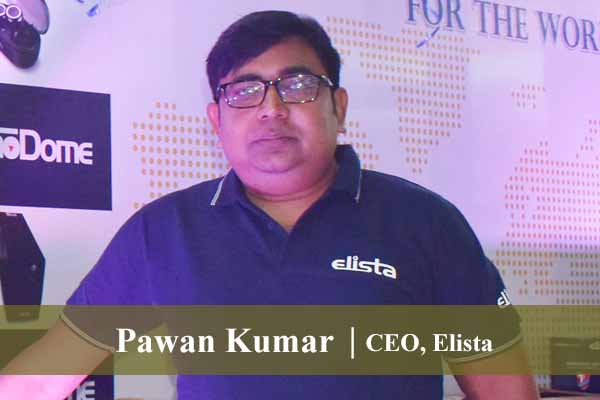The government is emphasizing on manufacturing in India through various PLI schemes under the umbrella Atmanirbhar Bharat policy. Founded in 2020, Elista is India leading world-class electronics, home appliances, IT, and mobile accessories brand. Part of the TeknoDome, UAE, Elista adheres to India Atmanirbhar principle of manufacturing. As a new company in the manufacturing space, TimesTech interacted with Pawan Kumar, CEO, Elista to know about the challenges and opportunity of manufacturing in India.
Read the full interview here:
TimesTech: Key features of Elista that differentiate it from its competitor?
Elista is a part of TeknoDome, which is a leader in the electronics industry for the past 20 years. We incepted the brand Elista on the foundations of strong research and development. As a result, our wide range of products is built with best-in-class features with superior technology. Coupled with the affordable price and excellent after-sales service, we have established Elista as one of the most popular brands among consumers. With our strong understanding of Tier-II & III markets and consumer expectations, we have been able to constantly deliver products that are well received in the market.
Even with the high level of competition in the domestic market, we have been able to cement our presence with a focus on our USP in just a few years. It is crucial because we launched the brand in the middle of the pandemic, which came with many supply chains and other related challenges.
TimesTech: Semiconductor chips are the major components of any electronic device. Does Elista face any challenges due to the shortage of chips globally? If so, how the company is dealing with it?
Semiconductor chips are integral to almost any industry today, including the consumer electronics sector. The entire world is grappling with the shortage of semiconductor chips.
Like any other manufacturer that needs these parts in the final products, it does affect our supply chain. However, with the lead time ranging from three to four months, we have built our manufacturing and supply chain ecosystem in a manner that we are able to have a workable plan for the next 12 months.
TimesTech: How is the government’s Atmanirbhar policy benefitting the consumer electronics sector? Are there any challenges to the policy?
The focus on self-reliance has provided the much-needed push to the manufacturing ecosystem in the country. Coupled with the production-linked incentive scheme, Make in India and other initiatives from the government, the country is expected to register strong growth in the manufacturing space in the foreseeable future.
There is a need to support the manufacturing of semiconductors and other raw materials in the country. In addition, government support is required to provide vital infrastructure requirements to the industry, including uninterrupted power supply and access to pure water. Good progress has been registered in these areas, and the situation is much better. However, there is still scope for improvement.
For India to become a global manufacturing powerhouse, the government needs to ensure reliable infrastructure with the availability of these vital raw materials required for final products. The industry is still dealing with power cuts and inadequate water supply treatment processes in some parts of the country. Before the semiconductor shortage became a global crisis, these were the key factors that discouraged foreign players from setting up a manufacturing base in the country.
TimesTech: What are your views on India’s semiconductor policy?
India is at a critical point where commitment is needed from the administration to build the domestic semiconductor industry. Industrial policies with incentives to the sector can generate investment in the initial phase. Still, the country needs a conducive business ecosystem pan-India along with favourable trade policies that support the completion of projects and yield results in the long run. A specific policy for the semiconductor industry would help to provide clarity to the global players.
For instance, the country’s foreign trade policy must be more supportive of the technology industry. Commitment is needed from the government to be a part of the international forums and multilateral trade groupings like the World Semiconductor Council that are pushing the global semiconductor industry.
The country’s commitment to being a part of such platforms would give a lot of confidence to investors and potential partners to build the domestic ecosystem. It would also extend India’s access to free trade in the semiconductor industry.
TimesTech: How is electronic waste being recycled in Elista, and what are the challenges in electronic waste recycling?
The e-waste recycling industry in India is still in its nascent phase. The high level of unorganized recycling is a big challenge. The recent e-waste recycling draft rules were a big step toward formal recycling. We are hopeful that the situation will improve in the near future.
As per the government requirements, we have tied up with e-waste recyclers that help us reduce the organization’s carbon footprint.
TimesTech: What are Elista’s future plans going forward?
We plan to be one of the leading brands in the consumer electronics space in the next few years. We have set a turnover of INR 500 crore by 2025 from domestic operations alone. By that time, we would have also established our presence in markets like the Middle East and CIS region owing to the ready distribution network of our parent company – TeknoDome.
We are also planning to enter the air conditioner segment in addition to launching a full range of products in the refrigerator segment. You can expect many more launches from Elista in segments like gaming accessories, TWS, Power Banks, Smartwatches etc., in the coming times.















